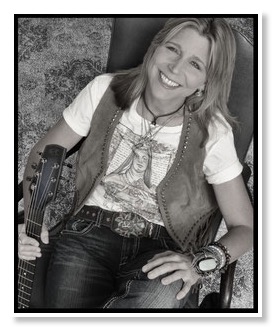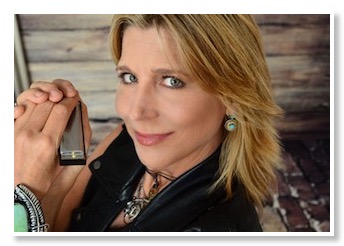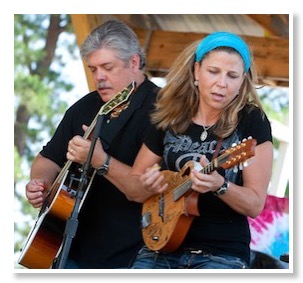Living Fearlessly
In an age when everything seems to be commercialized and corporatized, more and more folks are turning to the "do it yourself" path for a more authentic, honest approach to life. No one does DIY better than Terri Hendrix – the 48-year-old San Antonio native has managed her own independent music career since 1996, when she laced up her "Two Dollar Shoes" and hit the road with a pre-email mailing list of dedicated fans.
 Twenty years later, this Texas legend continues to bend genre and color outside the lines. Hendrix gives back to the community that has given her the freedom to follow her creative muse with her 501(c)(3) nonprofit, Own Your Own Universe (OYOU). At the time of this interview she has recorded 11 studio albums, a retrospective album, two live albums, a Christmas EP, as well as two bootleg albums of her live shows with music producer and artist Lloyd Maines.
Twenty years later, this Texas legend continues to bend genre and color outside the lines. Hendrix gives back to the community that has given her the freedom to follow her creative muse with her 501(c)(3) nonprofit, Own Your Own Universe (OYOU). At the time of this interview she has recorded 11 studio albums, a retrospective album, two live albums, a Christmas EP, as well as two bootleg albums of her live shows with music producer and artist Lloyd Maines.
Recently, Hendrix took time away from her Project 5 recording session to get real with us about her music, the creative process, and living fearlessly.
Nori Hubert: Terri, you've managed yourself independently as a musician since 1996. There have been a lot of changes in the music industry since then. How has the commercial nature of the industry, the tech boom, and popular culture effected/influenced you as an independent artist?
Terri Hendrix: I've ran my own label since 1996. What made it work then, still makes it work now. It's all about cultivating and caring for your fan base. Creating a positive vibe. How the changes have affected me most as an artist, is that I tour as a duo more and not a band. It's more economical given CD sales have been on the decline. It's influenced me as an artist because now more than ever I can experiment as an independent artist. Having less dollars coming into my record label end of things has opened up new creative outlets that produce income. These include studio work and taking my 12-year-old workshop, "Life's a Song," on the road.
 What's the most challenging aspect of managing your own career? What's the most rewarding?
What's the most challenging aspect of managing your own career? What's the most rewarding?
The most challenging aspect is that I feel it takes away from my writing. The most rewarding is that by managing it myself I don't have a slew of people to deal with. This gives me more time to write. See the dilemma?
In your view what sets the Texas music scene apart from the rest of the country
Our folk roots meet twang.
Talk about the creative process for and what it takes from you?
I have to make time to write. To get the song out takes time. Songs will haunt me and I'll get obsessed. I'm still not done with "Bury the Devil" on Slaughterhouse Sessions. Even though that song is technically done, I'm not done. I'm going to revisit the subject matter. What it takes from me is a sense of sanity. I honestly obsess over lyrics.
Can you share a little about how living with epilepsy has impacted and influenced your career and artistry?
I'd have a totally different career if I didn't have Epilepsy. I was diagnosed in 1989, but was able to control it for the most part with diet. Due to hormones, it reared its head with a vengeance in 2003. This was at a crucial time in my career. Tours had to be cancelled. The meds made me sick. I lost so much weight. I was depressed. I was in the Blue Cross Blue Shield High Risk Pool for health insurance, and still spent most of my savings trying to get better. A medication made my throat swell and I got vocal nodes and lost my voice. It was only in losing pretty much everything, that I found my courage. There would be no OYOU without Epilepsy. The OYOU is a big breathing piece of art. I went from sad, to mad, to angry, to at peace with my condition. There are people with a way more difficult road than I have. My case is actually pretty mild compared to some.
http://www.ownyourownuniverse.org/
 How would you define yourself in terms of musical genre?
How would you define yourself in terms of musical genre?
I'm a folk singer and I write folk songs and stick it all in whatever genre I feel the tune can rest inside
How did OYOU come about? What was it like building a nonprofit from the ground up?
It came about because of Epilepsy. It became an official nonprofit in 2012. It's tough building it, but I'm not an island. I have good people helping me.
Tell us a bit about Project 5 – conception, crafting it all together, and what to expect going forward?
It's basically a culmination of writing I've been working on for years. The book is an exploration of epilepsy and the mistakes I've made along the way. It's also a book about listening to your body. Your body is the best doctor. The music and book all explore the topics of love, faith, and resilience. I break down the albums here and how they tie into one another:
http://www.terrihendrix.com/project-5/
In the Digital Age, what do you think is the best way for artists to engage with their fans?
Go beyond Kickstarter. Go beyond social media. Make it about community. Make it about a sense of purpose higher than simply self-promotion. Remember that it all starts with a song though. Practice. Always strive to improve. No matter how good you are, always get better.
What would you like to share with your fans?
I am grateful for the opportunity to have this journey. It would have been impossible without their support. With my last release "Slaughterhouse Sessions," I went totally underground and bypassed promotion. They were my promotion. I could not have sold one record without them. I am GRATEFUL.
by Nori Hubert

Recently, Hendrix took time away from her Project 5 recording session to get real with us about her music, the creative process, and living fearlessly.
Nori Hubert: Terri, you've managed yourself independently as a musician since 1996. There have been a lot of changes in the music industry since then. How has the commercial nature of the industry, the tech boom, and popular culture effected/influenced you as an independent artist?
Terri Hendrix: I've ran my own label since 1996. What made it work then, still makes it work now. It's all about cultivating and caring for your fan base. Creating a positive vibe. How the changes have affected me most as an artist, is that I tour as a duo more and not a band. It's more economical given CD sales have been on the decline. It's influenced me as an artist because now more than ever I can experiment as an independent artist. Having less dollars coming into my record label end of things has opened up new creative outlets that produce income. These include studio work and taking my 12-year-old workshop, "Life's a Song," on the road.

The most challenging aspect is that I feel it takes away from my writing. The most rewarding is that by managing it myself I don't have a slew of people to deal with. This gives me more time to write. See the dilemma?
In your view what sets the Texas music scene apart from the rest of the country
Our folk roots meet twang.
Talk about the creative process for and what it takes from you?
I have to make time to write. To get the song out takes time. Songs will haunt me and I'll get obsessed. I'm still not done with "Bury the Devil" on Slaughterhouse Sessions. Even though that song is technically done, I'm not done. I'm going to revisit the subject matter. What it takes from me is a sense of sanity. I honestly obsess over lyrics.
Can you share a little about how living with epilepsy has impacted and influenced your career and artistry?
I'd have a totally different career if I didn't have Epilepsy. I was diagnosed in 1989, but was able to control it for the most part with diet. Due to hormones, it reared its head with a vengeance in 2003. This was at a crucial time in my career. Tours had to be cancelled. The meds made me sick. I lost so much weight. I was depressed. I was in the Blue Cross Blue Shield High Risk Pool for health insurance, and still spent most of my savings trying to get better. A medication made my throat swell and I got vocal nodes and lost my voice. It was only in losing pretty much everything, that I found my courage. There would be no OYOU without Epilepsy. The OYOU is a big breathing piece of art. I went from sad, to mad, to angry, to at peace with my condition. There are people with a way more difficult road than I have. My case is actually pretty mild compared to some.
http://www.ownyourownuniverse.org/

I'm a folk singer and I write folk songs and stick it all in whatever genre I feel the tune can rest inside
How did OYOU come about? What was it like building a nonprofit from the ground up?
It came about because of Epilepsy. It became an official nonprofit in 2012. It's tough building it, but I'm not an island. I have good people helping me.
Tell us a bit about Project 5 – conception, crafting it all together, and what to expect going forward?
It's basically a culmination of writing I've been working on for years. The book is an exploration of epilepsy and the mistakes I've made along the way. It's also a book about listening to your body. Your body is the best doctor. The music and book all explore the topics of love, faith, and resilience. I break down the albums here and how they tie into one another:
http://www.terrihendrix.com/project-5/
In the Digital Age, what do you think is the best way for artists to engage with their fans?
Go beyond Kickstarter. Go beyond social media. Make it about community. Make it about a sense of purpose higher than simply self-promotion. Remember that it all starts with a song though. Practice. Always strive to improve. No matter how good you are, always get better.
What would you like to share with your fans?
I am grateful for the opportunity to have this journey. It would have been impossible without their support. With my last release "Slaughterhouse Sessions," I went totally underground and bypassed promotion. They were my promotion. I could not have sold one record without them. I am GRATEFUL.
by Nori Hubert


